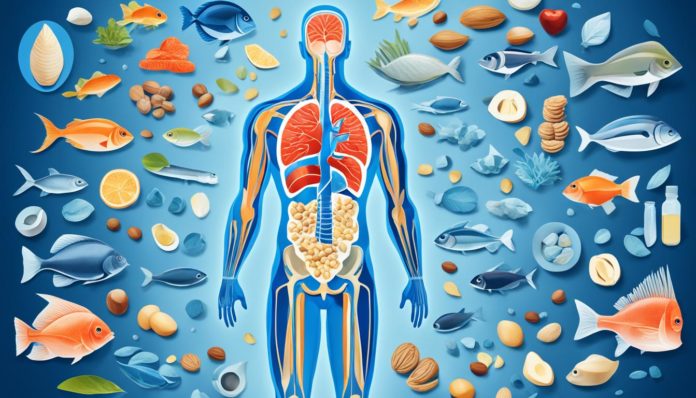We must look closely at Omega-3 fatty acids, like EPA and DHA, as they are key for our health. They are vital for the cells in our body and bring many health benefits. Omega-3s are known for making our hearts and brains work better and for reducing body inflammation.
The value of omega-3 in our diet is huge, so knowing how they help is important. By eating foods rich in EPA and DHA, we can greatly improve our health over time. For thorough information on these fats and their importance, check out this comprehensive guide.
Key Takeaways
- Omega-3 fatty acids, especially EPA and DHA, are crucial for cellular membrane function.
- They offer numerous health benefits, including improved heart and brain health.
- EPA and DHA help reduce inflammation throughout the body.
- The dietary importance of omega-3 highlights the need for sufficient intake of these nutrients.
- Incorporating omega-3 rich foods into your diet can optimize overall health.
Understanding Omega-3 Fatty Acids
Omega-3 fatty acids are essential fats needed for your health. They help keep cell membranes working well. Getting enough omega-3 improves various bodily functions and our overall health.
What are Omega-3 Fatty Acids?
Omega-3s are a type of fat with a special structure. This structure makes them act differently in the body. Since our bodies don’t make enough, eating foods rich in omega-3 is key. It helps keep our cell membranes flexible and functional.
Types of Omega-3: EPA and DHA
The most useful omega-3 types for us are EPA and DHA. Found mostly in fish, they’re important for heart and brain health. These fats help our cell membranes work better, allowing nutrients and signals to pass through easily. Experts suggest eating fish or taking fish oil supplements. This should be done under a doctor’s advice, as per the Cleveland Clinic recommendations.

If fish isn’t an option, try flaxseed or algae oil for omega-3s. They mostly have ALA, which our bodies turn into EPA and DHA, though in small amounts. For more on the role of fats in your diet, check out this detailed guide on dietary fats.
Health Benefits of Omega-3 Fatty Acids (EPA and DHA)
Omega-3 fatty acids are praised for their vast health benefits. They are vital because of EPA and DHA. These nutrients are key to improving our health in many ways.
Cardiovascular Health
Omega-3 fatty acids play a big role in preventing heart disease. EPA and DHA lower triglycerides and blood pressure. They also cut down the risk of irregular heartbeat. This helps keep our hearts healthy and lowers the chance of heart disease over time.

Brain and Mental Health
The benefit of Omega-3s on our brain and mental health is huge. They support brain development and function. EPA and DHA also help manage depression by stabilizing mood. This is critical for fighting depression and keeping our minds well.
Many studies show that Omega-3s are beneficial for our brains and mood. They are necessary for good mental health.
Anti-inflammatory Properties
Omega-3 fatty acids work well against inflammation. By cutting down on inflammatory cytokines, EPA and DHA ease chronic inflammation and autoimmune diseases. This keeps our overall health in check and prevents inflammation-related issues from getting worse.
| Health Benefit | Mechanism | Outcome |
|---|---|---|
| Cardiovascular Health | Lowering triglycerides, reducing blood pressure | Heart disease prevention |
| Brain and Mental Health | Supporting cognitive function, mood stabilization | Enhanced cognitive function, depression management |
| Anti-inflammatory Properties | Reducing inflammatory cytokines | Inflammation reduction |
Sources of EPA and DHA
Omega-3 fatty acids, especially EPA and DHA, are key for our health. Understanding their sources helps us plan our meals better. This ensures we get the health boosts we need.
Marine Sources
Fatty fish like salmon, mackerel, and sardines are full of EPA and DHA. Eating these fish often helps our hearts, brains, and mental state. Seafood, including shrimp and cod, also has these omega-3s but in smaller amounts.
Plant-Based Sources
If you don’t eat fish, there’s still hope. Algae-based omega-3s give us DHA without eating fish. Algal oil supplements are a great, green way to get these fats.
Also, flaxseeds and walnuts have ALA, a different omega-3. Our bodies change some ALA to EPA and DHA. Adding these to your diet makes up for not eating fish.
| Source | Type of Omega-3 | Examples |
|---|---|---|
| Marine Sources | EPA, DHA | Salmon, Mackerel, Sardines |
| Plant-Based Sources | ALA | Flaxseeds, Walnuts |
| Algae-Based | DHA | Algal Oil Supplements |
Importance of EPA and DHA in the Diet
Eating a balanced diet with essential fats like EPA and DHA is vital. These omega-3 fatty acids are key for our health. Yet, getting enough can be tough due to different eating habits.
Omega-3 dietary intake is often low in many people’s diets, especially if they don’t eat much fish. Finding ways to add these important nutrients is crucial. Without enough EPA and DHA, people can face serious health issues.
Adding a variety of EPA and DHA sources to your diet can help you meet your omega-3 needs:
- Fatty fish like salmon, mackerel, and sardines
- Algae-based supplements for vegans or vegetarians
- Fortified foods like some eggs and dairy
Knowing the value of EPA and DHA makes it easier to choose foods that meet your body’s needs.
| Food Source | EPA and DHA Content (per 100g) |
|---|---|
| Salmon | 2.3g |
| Mackerel | 2.0g |
| Sardines | 1.5g |
EPA and DHA Supplements: What You Need to Know
Looking into EPA and DHA supplements might feel tricky because there are so many choices. You might choose from fish oil pills or vegan supplements. It’s key to focus on the quality and safety of these supplements.
Choosing the Best Supplements
In picking top EPA and DHA supplements, it’s vital to know where they come from. For fish oil, go for ones from fish caught sustainably. This action supports the environment too. Make sure these products get checked by another party. This ensures they are pure and safe. For those avoiding animal products, algae-based vegan options are great too.
To judge quality and safety, look for seals like USP or NSF. These symbols mean the supplements are up to the highest standards. They’ve passed some tough tests.
Potential Side Effects and Considerations
EPA and DHA supplements are good for you, but taking too much isn’t. It can cause stomach upset or increase bleeding risk. Always stick to the suggested amount. And if you’re on medication, talk to a healthcare provider before starting these supplements.
There are special groups, like pregnant women or those with certain health issues, who should be extra careful. Making sure your supplements are safe and high-quality reduces risks.
Recommended Dosages for Optimal Health
It’s important to get enough omega-3 fatty acids for your health. The right amount can depend on your age and health needs.
Daily Intake Guidelines
Adults need about 250–500 mg of EPA and DHA omega-3s every day. But, some people might need more. Children and older people have different needs for omega-3.
Special Considerations for Different Age Groups
Children, the elderly, pregnant, and breastfeeding women need special omega-3 care. Children need it for brain and eye growth. Elderly people need it for their hearts and minds.
| Age Group | Recommended Daily Intake (EPA + DHA) |
|---|---|
| Infants (0-12 months) | 0.5 g |
| Children (1-3 years) | 0.7 g |
| Children (4-8 years) | 0.9 g |
| Children (9-13 years) | 1.2 g (Boys), 1.0 g (Girls) |
| Adults | 1.6 g (Men), 1.1 g (Women) |
| Pregnant Women | 1.4 g |
| Breastfeeding Women | 1.3 g |
| Elderly | 1.6 g (Men), 1.1 g (Women) |
EPA vs DHA: Understanding the Differences
Omega-3 fatty acids are key to our well-being, with EPA (eicosapentaenoic acid) and DHA (docosahexaenoic acid) leading the way. They each offer unique health advantages. Knowing these can help us focus on specific health goals.
Health Benefits Comparison
EPA and DHA share some benefits, but each shines in its area. EPA is great for reducing inflammation. This is good news for our hearts and sore joints. Meanwhile, DHA plays a big part in keeping our brains sharp and our mood steady.
| Fatty Acid | Primary Health Benefits | Specific Outcomes |
|---|---|---|
| EPA | Anti-inflammatory | Improved heart health, reduced joint inflammation |
| DHA | Brain and retinal function | Enhanced cognitive function, better mental health |
Which One Do You Need More?
Choosing between more EPA or DHA depends on what health areas you’re focusing on. If your goal is a healthier heart or to lower inflammation, then EPA is your friend. But if you’re aiming to boost your brain power or improve mental health, give DHA the spotlight. Studies suggest a 1:2 EPA to DHA ratio for overall well-being.
Incorporating Omega-3 Rich Foods into Your Diet
Adding omega-3 rich foods to your diet can be both tasty and healthy. With smart meal planning, you can improve your health and enjoy different foods. Let’s dive into some meal ideas and tips to get more omega-3 in your diet.
Meal Ideas and Recipes
Boosting your omega-3 intake through meals means using both sea and plant sources. Here are some tasty ideas:
- Breakfast: Try a smoothie bowl with chia seeds, flax seeds, and walnuts for an omega-3 boost.
- Lunch: Make a quinoa salad with salmon pieces, avocado, and hemp seeds sprinkled on top.
- Dinner: Savor grilled mackerel with Brussels sprouts cooked in olive oil.
- Snacks: Enjoy almonds or mix your own trail mix with dried fruit and pumpkin seeds.
These meals are not only rich in omega-3s but also offer a variety of tastes and textures.
Tips for Maximizing Absorption
It’s key to make the most of omega-3s by absorbing them well. Here are some tips for cooking to boost their benefits:
- Pair with Antioxidant-Rich Foods: Eat omega-3 rich foods with antioxidants like greens, berries, and tomatoes.
- Choose the Right Fats: Cook with good fats like olive oil or coconut oil to help absorb omega-3s better.
- Consider Food Preparation Methods: Lightly grill or steam fish to keep more omega-3 than frying.
- Utilize Supplements Wisely: If using supplements, take them with fatty meals for better absorption.
Using these tips in your omega-3 meal planning will greatly enhance how well your body uses these vital fatty acids.
Conclusion
We’ve covered a lot about omega-3 benefits, especially EPA and DHA. These fats help your heart, brain, and reduce inflammation. By knowing where EPA and DHA come from, like fish or plants, you can make smarter food choices.
Adding these nutrients to your diet or through supplements is good for your health. It’s important to get the right amounts of EPA and DHA. Make sure to watch out for side effects and pick supplements that fit your health needs.
Using omega-3s wisely is great for your health over your lifetime. You can eat foods rich in omega-3s or use supplements to get what you need. For more tips on staying healthy, check out info on obesity and blood pressure. Making these choices helps you live a better, healthier life.
FAQ
What are Omega-3 Fatty Acids?
Omega-3 fatty acids are important polyunsaturated fats needed for our health. Our bodies can’t make them, so we must get them from food. They include ALA, EPA, and DHA types.
What are the benefits of Omega-3 Fatty Acids?
Omega-3s boost heart health, brain function, and reduce inflammation. They lower bad fat in your blood and help prevent heart disease. Their role is also vital in controlling blood pressure and supporting your brain and mood.
They are also used in treating diseases that cause swelling and autoimmune issues.
What are the main sources of EPA and DHA?
EPA and DHA mainly come from fatty fish like salmon and mackerel. For those who don’t eat fish, algae Omega-3 supplements are a good option. Flaxseeds and walnuts have ALA, but our bodies don’t change it well to EPA and DHA.
How much Omega-3 should I consume daily?
How much Omega-3 you need varies by your age, gender, and health. Usually, adults should get 250-500 milligrams of EPA and DHA daily. But this can change for different groups, such as pregnant women or those with certain health issues.
Are there any potential side effects of taking EPA and DHA supplements?
EPA and DHA supplements are safe for many but can cause stomach upset or diarrhea for some. Taking too much might lead to higher bleeding risk or affect blood-thinning medicines. Always pick quality supplements and talk to a doctor before starting them.
How do EPA and DHA differ in their health benefits?
EPA is known for fighting inflammation and helping heart health. DHA is key for brain development and function. Both are vital, but their health benefits can be different depending on your health needs and goals.
What are some tips for incorporating more Omega-3 rich foods into my diet?
To eat more omega-3 rich foods, add fatty fish to your diet twice a week. Flaxseeds or chia seeds are great in smoothies or on yogurt. If you’re vegan, consider algae-based supplements.
Cooking omega-3 rich foods with high-antioxidant veggies helps your body absorb them better.


